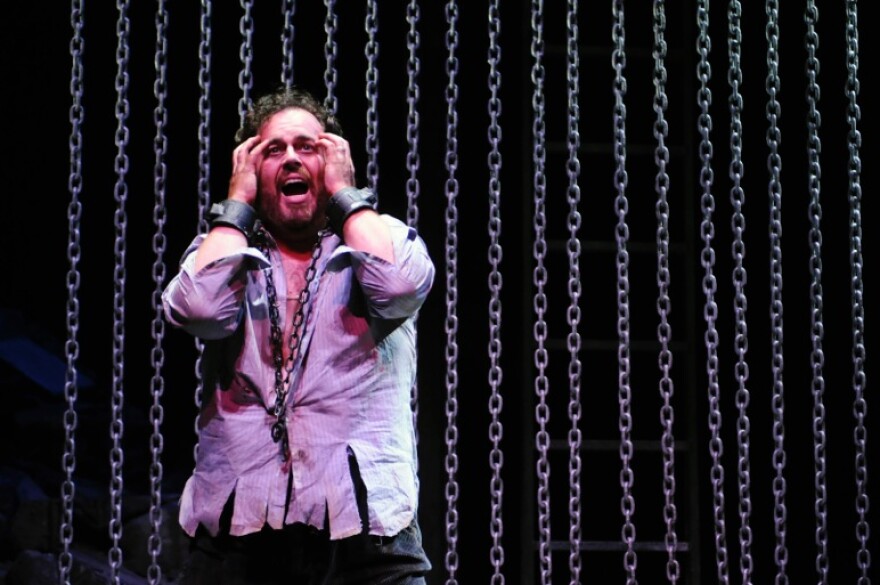Kentucky Opera opens its new season this week with “Fidelio,” Ludwig von Beethoven’s only opera. It’s part of the “repertoire reimagined,” a five-year effort to produce more adventuresome works, from the under-produced like “Fidelio” to new operas like Daron Hagen and Barbara Grecki's “A Woman in Morocco,” which will run during the Festival of Faiths in May.The initiative also includes an emphasis on the American experience, which this season will include Giacomo Puccini’s “The Girl of the Golden West,” a western opera (Nov. 14-16), and Andre Previn’s adaptation of Tennessee Williams’ “A Streetcar Named Desire” (Feb. 13-15).Conducted by Joseph Mechavich, “Fidelio” plays Friday at 8 p.m. and Sunday, 2 p.m., at the Brown Theatre on Broadway.During a recent Lunch and Listen program sponsored by our sister station WUOL, Kentucky Opera general manager David Roth acknowledged the irony in launching this new path for the opera focused on under-appreciated works with an opera by none other than Beethoven. But “Fidelio” is an early work of Beethoven’s, and Kentucky Opera has only produced it once in the company’s 62 years.“He began composing ‘Fidelio’ in 1804 when he was 34 years old. By then he had developed a reputation for himself in Vienna, following in the footsteps of Haydn and Mozart, but he had not yet created the masterworks for which we all recognize today as the craft of a true genius,” said Roth.Set in Spain, “Fidelio” is the story of Leonore, a woman who disguises herself as a man (“Fidelio”) to break into a prison to free her husband, a wrongfully-incarcerated political prisoner of a despotic governor and sadistic warden. Kara Shay Thomson and Jonathan Burton, who played the leads in the last Kentucky Opera production of “Tosca,” return to the company to play husband and wife.Stage director Lilian Groag created this production of “Fidelio” for Virginia Opera 10 years ago. The prison setting, Groag said, lends itself to staging the production in any number of countries or eras.“The nature of these establishments is pretty much the same, especially when they’re run by a psychopath,” said Groag.But rather than set this production in a Russian gulag or a Nazi concentration camp, Groag opted to focus on a more general, universal struggle between good and evil. The story is set in an undefined 21st century prison run by a rogue leader with his own ragtag army. But she drew her inspiration from one very specific image – a photo she once saw of Baghdad, where someone had pushed a grand piano out of a fifth-story window to crash open on the sidewalk.“It was one of the most painfully and shocking photos I had ever seen. I kept it forever. When ‘Fidelio’ came up, I thought, what if they are in a place that is that besieged, and that in the courtyard of this prison there is this ruined, destroyed piano? Which to me symbolizes the destruction of the arts, which I think is something that is happening today,” said Groag.“I think we’re dulling the spirit of our world by the basic strangulation of the arts,” she added.Though Beethoven structured “Fidelio” as a “singspiel,” a sort of precursor to the modern American musical that employs spoken dialog between songs, overall, “Fidelio” is not that simple and lighthearted. Beethoven’s torment over losing his hearing pervades his work of this period. Structured as a simple melodrama, “Fidelio” opens with fairly traditional numbers, but then over the course of the opera, Beethoven blows the formulas apart, delving into darker themes in the second act.“Fidelio” is part of Beethoven’s influential middle period, composed and revised over a period of 10 years, during which time the composer wrote six of his most important symphonies.“It is here, in this period, that Beethoven pulled the entire world of composition into the 19th century – a world of upheaval, political conflict and passionate struggle,” said Roth.Watch the entire preview concert in the Louisville Public Media performance studio.
Kentucky Opera Opens Reimagined Repertoire With Beethoven's Prison Drama 'Fidelio'


